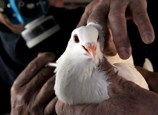
Media should use the term "second generation with entrepreneurship" instead of "rich second generation" to draw a full and fair picture of the young people's lives, a top political adviser said.
Sammy Lee, a member of the National Committee of the Chinese People's Political Consultative Conference from Hong Kong, and chairman and managing director of the Lee Kum Kee Health Products Group Ltd, said the current social image painted for this group is biased, and he hopes to balance news coverage by suggesting this small change in media coverage.
The latest case of the "rich second generation" that got media attention was a group of pictures showing a luxurious lifestyle that were posted on a 16-year-old's micro blog. The person who appeared in the pictures lived like a prince, surrounded by beautiful girls, celebrities, top-of-the-line cars, a private jet and yacht, attendants, and countless dazzling luxury brands.
The micro-blogger's identification has still not been confirmed, though some netizens claim that his father is an insurance-company executive. All the photos that were posted on the micro blog have been deleted.
This is not a unique case, as online photos showing off luxurious lifestyles always get people's attention. In June 2011, a young woman named Guo Meimei attracted attention with her micro blog posts that flaunted her luxurious living, including a photo of her posing with a Maserati. The micro blog led to suspicions of corruption at The Red Cross Society of China, as Guo claimed to be a Red Cross official. The claim was later disproved.
When it comes to the life of the "rich second generation" in China, media reports, domestic or abroad, always talk about their lives in terms of fancy sports cars, liquor and all-night parties.
Lee said such interpretation is biased and hopes the media and public can view this group objectively.
"Many of them are actually second 'generation with entrepreneurship', fighting hard for their own career just like everybody else," Lee told China Daily. He said he himself used to work nearly 20 hours a day for about a year.
He said he made the suggestion not only to polish the group's image, but with the hope of passing on a positive attitude to society.
"Public attention may be shifted to the group's entrepreneurship rather than simply addressing their parents' wealth," Lee said. "Those who belong to the group but lack such spirit may also be alerted and decide to change their lives."
Lee, 49, who went to the US to study at the age of 12, labels himself "fourth generation with entrepreneurship", indicating that the family business of the Lee Kum Kee brand has been passed on to the fourth generation, and he has been seeking new way to keep the company alive, though statistics show that most don't last three generations.
According to figures released by Family Business Institute, a US consulting firm serving family enterprises, only 30 percent of family enterprises have been passed on successfully from the founder to the second generation. The success rate drops to 12 percent when it comes to the third generation.
But the Lee Kum Kee brand has celebrated its 125th birthday in 2013, and is still developing under the management of Lee and his four brothers and sisters, the fourth generation of the family.
As a policy adviser, Lee has submitted proposals relating to the development of family businesses in China for six straight years.
He said there are more than 10 million private companies in China now, 90 percent above are family businesses, providing for about 80 percent of all the job opportunities.
During this year's two sessions, he suggested the government issue policies to promote building platforms for family businesses to share their experience on keeping their companies thriving, and to support organizations established by the family enterprises.
"Such platforms and organizations may work as self-education of the entrepreneurs, and may also facilitate efficient communication between the government and family businesses," he said.
















 Life aboard a fishing boat under bridge in city of Chongqing
Life aboard a fishing boat under bridge in city of Chongqing


![]()
